| Birmingham Botanical Gardens | |
|---|---|
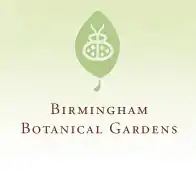 | |
| Location | 2612 Lane Park Road Birmingham, Alabama 35223 |
| Coordinates | 33°29′30″N 86°46′28″W / 33.4917°N 86.7745°W |
| Area | 67.5 acres (27.3 ha) |
| Created | 1963 |
| Operated by | City of Birmingham/ Friends of Birmingham Botanical Gardens |
| Visitors | 350,000+[1] |
| Open | Dawn to dusk |
| Status | Open all year |
| Website | www |
The Birmingham Botanical Gardens is 67.5-acre (27.3 ha) of botanical gardens located adjacent to Lane Park at the southern foot of Red Mountain in Birmingham, Alabama. The gardens are home to over 12,000 different types of plants, 25 unique gardens, more than 30 works of original outdoor sculpture, and several miles of walking paths.[2] With more than 350,000 annual visitors,[1] the Birmingham Botanical Gardens qualify as one of Alabama's top free-admittance tourist attractions. The Birmingham Botanical Gardens is also a part of the American Public Gardens Association.
The gardens include a garden center that has a library (the largest public horticulture library in the U.S.[3]), auditorium, Linn-Henley Lecture Hall, Blount Education Center, Gerlach Plant Information Center, Alabama Cooperative Extension System office, Arrington Children's Plant Adventure Zone, and a restaurant.
History
The Birmingham Botanical Gardens began as an idea prior to 1960. The Birmingham mayor of that time, James W. Morgan, led an effort to establish the gardens on a 69-acre (28 ha) portion of unused city property east of the Birmingham Zoo on the side of Red Mountain. The garden officially opened in 1963. The Birmingham Botanical Society, now known as the Friends of Birmingham Botanical Gardens, was established in 1964 with a mission of helping the city to support and improve the garden.[4]
Friends of Birmingham Botanical Gardens
While the City of Birmingham funds the core necessities of the Birmingham Botanical Gardens (BBG), the Friends of Birmingham Botanical Gardens (FBBG) was formed to raise funds for the gardens outside of the day-to-day needs. According to the BBG website, the mission of the FBBG is, “to protect, nurture, and share the Gardens’ countless wonders”.[5] Not only does the FBBG help fundraise for the gardens, they provide outreach and educational programs to help patrons learn about the gardens and its importance to the surrounding community.
Library
Not only does the Birmingham Botanical Garden boast a wide variety of flora, it also hosts a library with over 14,000 books, audiobooks, DVDs, and more. These items include books on gardening for children or adults, horticulture magazines, and even teaching resources with lesson plan materials. The Library also contains an Archives and Rare Book Room that was created in partnership with, “Friends of Birmingham Botanical Gardens, the City of Birmingham, the Alabama Cooperative Extension System, plant groups, garden clubs, and societies.”.[6] The archive contains many different manuscripts, photographs, catalogs, and even plant fossils.
Another interesting and unique aspect of the BBG library is that it hosts a seed exchange program to foster a time honored tradition that helps connect those in the community. This exchange encourages the community to plant native flora and provides an opportunity for the community to bond through sharing both seeds and information. The exchange requires the patron to donate a package of fresh seeds (non-GMO) or make a $10 donation before choosing a packet to take home.
Gardens and garden features
- Sonat Lake
- Hill Garden
- Kayser Lily Pool
- Cochran Water Wall
- Dunn Formal Rose Garden (featuring a Moon tree[7])
- Ireland Old-Fashioned Rose Garden
- Crape Myrtle Garden Conservatory
- Desert House
- Camellia House
- Samford Orchid Display Room
- Formal Garden
- Queen’s Gates
- Twin Urn Fountains
- Cabaniss Walk
- Forman Garden
- Enabling Garden
- Thompson Enthusiast Garden
- Bruno Vegetable Garden
- Herb Terrace
- Hess Camellia Garden
- Bog Gardens
- Kaul Wildflower Garden
- Fern Glade
- Curry Rhododendron Garden
- Little Ones’ Memory Garden
- Curry Rhododendron Species Garden
- Jemison Lily Garden
- Hosta Walk
- Ireland Iris Garden
- The Southern Living Garden
- Lawler Gates
- McReynolds Garden
- Barber Alabama Woodlands
- Hulsey Woods
- Japanese Gardens
- Torii (Gateway to Heaven)
- Tea House and Karesansui
- Hulsey Woods
- Cultural Pavilion
- Viewing Shelter and Long Life Lake
- Bonsai House
- Richard Arrington Plant Adventure Zone
 Long Life Lake bridge
Long Life Lake bridge The Taylor Gate
The Taylor Gate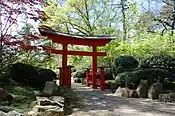
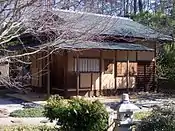 Tea House
Tea House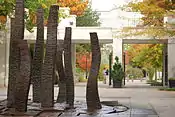 Granite Garden Fountain in Blount Square
Granite Garden Fountain in Blount Square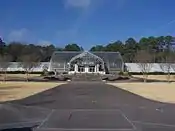 The Conservatory during winter
The Conservatory during winter The Friendship Bell
The Friendship Bell Hill Garden during winter
Hill Garden during winter
See also
References
- 1 2 "About Us". Birmingham Botanical Gardens. Archived from the original on November 9, 2012. Retrieved October 26, 2012.
- ↑ Fred Spicer (October 4, 2012). "A Small Ode to Oaks". Birmingham News. Retrieved October 27, 2012.
- ↑ "Welcome - Birmingham Botanical Gardens". bbgardens.org. Retrieved 2021-12-09.
- ↑ "Garden History". Birmingham Botanical Gardens. Archived from the original on November 9, 2012. Retrieved October 26, 2012.
- ↑ Friends, About the. "About". Birmingham Botanical Gardens. Retrieved 20 April 2023.
- ↑ Rare Books Room, Archives and. "Archives and Rare Book Rooms". Birmingham Botanical Gardens. Retrieved 20 April 2023.
- ↑ "Birmingham Botanical Gardens Moon Tree". nssdc.gsfc.nasa.gov. Retrieved 2021-11-02.